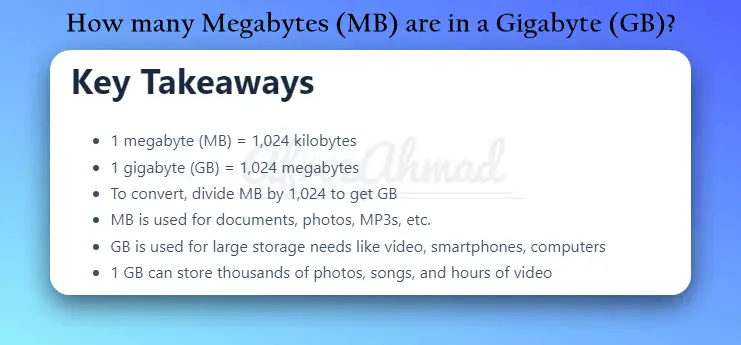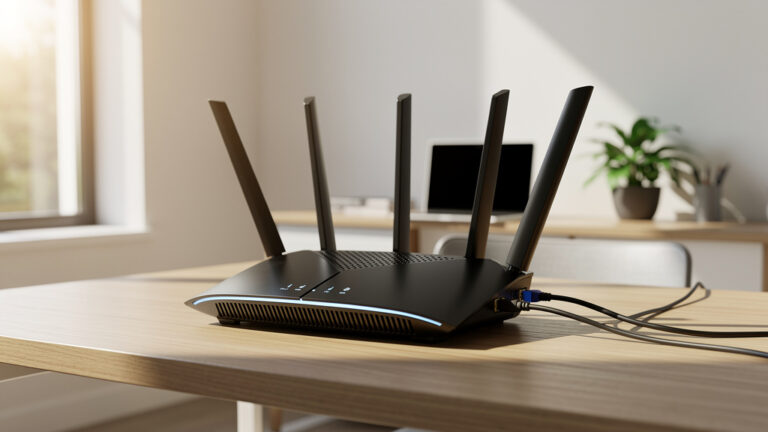How many Megabytes(MB) are in a Gigabyte(GB)? – 1 GB or Gigabyte = 1,024 MB or Megabyte.
GB to MB Calculator
Gigabyte to Megabyte Converter
Result:
Key Takeaways
- 1 megabyte (MB) = 1,024 kilobytes
- 1 gigabyte (GB) = 1,024 megabytes
- To convert, divide MB by 1,024 to get GB
- MB is used for documents, photos, MP3s, etc.
- GB is used for large storage needs like video, smartphones, computers
- 1 GB can store thousands of photos, songs, and hours of video
Understanding the relationship between megabytes and gigabytes is key for digital storage. Use this guide anytime you need to convert or calculate MB vs GB!
What is a Megabyte?
A megabyte (MB) is a unit of digital information equal to 1,024 kilobytes (KB).
A byte consists of 8 bits, which are binary digits (either 0 or 1). Kilobytes (KB) represent 1,024 bytes. So a megabyte is 1,024 kilobytes.
Some examples of megabyte file sizes:
- A 3-minute MP3 song is approximately 3 MB
- A 5 megapixel JPEG photo is around 5 MB
- A 10-page Word document is about 0.5 MB
Megabytes are commonly used to measure the size of documents, photos, audio files and other digital content.
What is a Gigabyte?
A gigabyte (GB) is a unit that is 1,024 megabytes (MB). Since a MB is 1,024 KB, a GB is ~1 billion bytes.
Gigabytes are used for larger storage needs:
- Smartphone storage (64GB, 128GB, etc.)
- Computer hard drives (500GB to 4TB typically)
- External storage drives
- 4K video files
- Video game install sizes
1 GB is over 1,000 times larger than 1 MB.
Converting Megabytes to Gigabytes
The relationship between MB and GB is:
1 GB = 1,024 MB
This is because computer storage uses binary units based on powers of 2.
To convert MB to GB, simply divide the megabytes by 1,024:
- 500 MB / 1,024 = 0.488 GB
- 750 MB / 1,024 = 0.732 GB
Going the other way:
- 2 GB x 1,024 = 2,048 MB
- 0.5 GB x 1,024 = 512 MB
Tip: To quickly estimate, 1 GB is approximately 1,000 MB. But the exact conversion is 1,024 MB per GB.
Checkout How Many Megabits in a Gigabit? Gbps to Mbps Calculator .
Real-World Examples
Let’s look at some real-world examples of MB and GB usage:
Streaming Video
- 1 minute of standard definition video = ~10 MB
- 1 minute of HD 1080p video = ~100 MB
- 1 hour Netflix show in 4K = ~7 GB
So with a 5 GB monthly data plan, you could stream about 45 minutes of HD video daily.
Smartphone Storage
- A 16 GB phone could store:
- 3,000 average photos
- Over 50 apps
- A few hundred songs
- A 128 GB phone could store:
- 25,000+ photos
- 500+ apps
- Thousands of songs
Computer Hard Drives
- A 250 GB hard drive can hold:
- 125,000 documents
- 250,000 MP3 songs
- 300 hours of HD video
- A 2 TB (terabyte) drive can store:
- 1,000,000 documents
- 2,000,000 MP3s
- Over 2,000 hours of HD video
As you can see, GB provides vastly more storage capacity compared to MB.
Other Relevant Units
There are a few other units to be aware of:
- Kilobyte (KB) – 1,024 bytes. Smallest unit commonly used.
- Terabyte (TB) – 1,024 GB. Used for large storage.
- Petabyte (PB) – 1,024 TB. Data warehouse scale.
- Bit – Single 0 or 1 binary digit.
| Unit | # of Bytes |
|---|---|
| Bit | 1 |
| Byte | 8 bits |
| KB | 1,024 bytes |
| MB | 1,024 KB |
| GB | 1,024 MB |
| TB | 1,024 GB |
| PB | 1,024 TB |
- Telecom Network Infrastructure: Complete Guide to Components & Design - January 6, 2026
- TP-Link TL-SG108E vs Netgear GS308E: Budget Smart Switches - January 5, 2026
- MikroTik CRS305-1G-4S+ Review: The Ultimate Budget SFP+ Switch Guide - December 25, 2025




